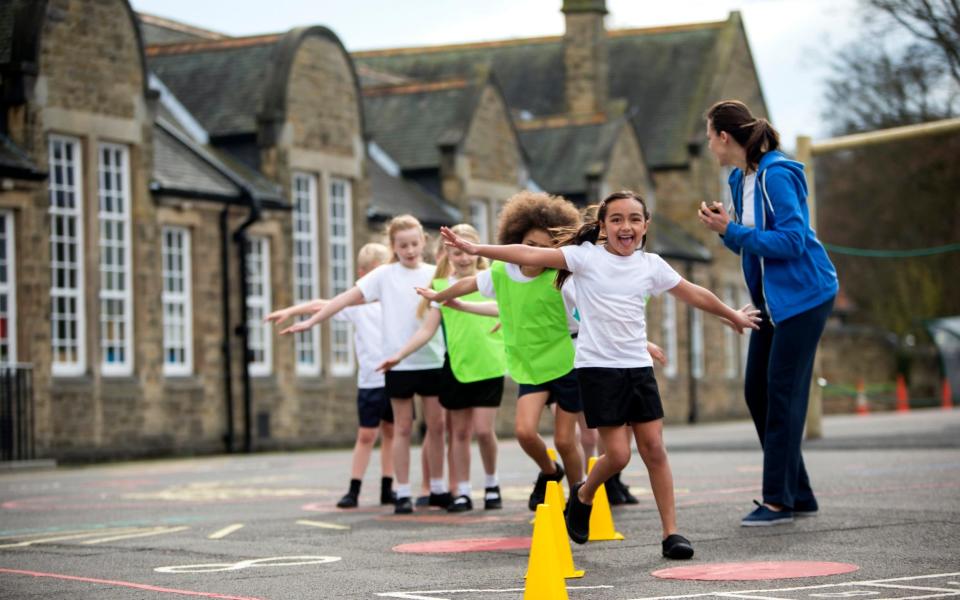Children placed at the centre of new Sport England strategy with physical activity to 'form heart of Covid recovery'

The Government has pledged that sport and physical activity will be “at the heart” of its Covid-19 recovery plan as part of a new 10-year Sport England strategy that will particularly focus on children and young people.
In a major boost to The Telegraph's Keep Kids Active campaign, the specific needs of children form one of the five key strands of a new national sporting plan until 2031 which will be backed by an immediate £50 million fund to help community sport re-emerge from the pandemic.
Specific initiatives for children and young people include £1.5 million on opening school sport facilities outside of teaching times, a further £1.5 million on a new online fitness resource that will target teenage girls and £400,000 on programmes to give young people the chance to volunteer in sport.
Called ‘Uniting the Movement’, Sport England has stressed that the strategy’s immediate focus will be the recovery of the sector when sports facilities reopen, potentially in April, followed by a longer-term emphasis on children and communities which are traditionally least active.
Fewer than half the nation’s children are currently meeting the recommended daily minimum of one hour of activity, with almost a third not even averaging 30 minutes of active time each day.
The challenges have been especially acute during three national lockdowns over this past year and prolonged periods when children’s sport has been cancelled and schools have been closed to most pupils.
Underpinning the new Sport England plan is a stated belief that every child “has the right to be active” and research showing that positive sporting experiences at a young age help build lifelong foundations. Active children are also more likely to be happier, more resilient and trusting of others. Fewer than one in five children, however, consider themselves to be physically literate and there is particular concern at rising obesity levels and declining mental health, with one in six children identified with ‘probable mental disorders’ in 2020 compared to one in nine in 2017.
The Sport England strategy specifically promises “an unrelenting focus on putting enjoyment at the heart of the experiences of children and young people’s involvement in sport and physical activity, recognising that this is the foundation for a long and healthy life”.
The Telegraph's campaign is backed by numerous leading athletes, governing bodies and influential sporting figures and has specifically called for the Government to implement a mandatory virtual physical education curriculum; create a centralised online hub with age-related activities and advice for parents; prioritise opening up kids' activity at the earliest opportunity; deliver a plan to put PE on a par with core subjects when schools return and open school facilities as community hubs during holidays.
With the Youth Sports Trust and the Oak National Academy yesterday also launching their own virtual PE curriculum and the Government promising to prioritise sport when society does reopen, three of the five campaign asks are already being addressed.
As well as children and young people, Sport England’s new strategy will focus on tackling long-standing inequalities which have been reinforced by the recent disruption. There are clear patterns of lower activity among people who are disabled, from lower socio-economic groups and from Black, Asian and Chinese backgrounds. Sport England promised “a sharp focus on providing more opportunities for those who are being left behind”.

The national strategy, which followed an 18-month consultation, will be supplemented imminently by a one-year action plan for the immediate Covid-19 crisis followed by a three-year plan. “At the heart of all this is a ruthless focus on providing opportunities to people and communities that have traditionally been left behind,” said Tim Hollingsworth, the Sport England chief executive. "We want every child and young person to enjoy the experiences they have playing sport and being active because we know that that's the foundation for a long and healthy life.”
Sports minister Nigel Huddleston said that the strategy would provide the base on which to invest in sport. “The Government is placing sport and physical activity at the heart of its coronavirus recovery plan,” he said. “Sport and physical activity are essential for our health and wellbeing and in helping bring communities together.”

